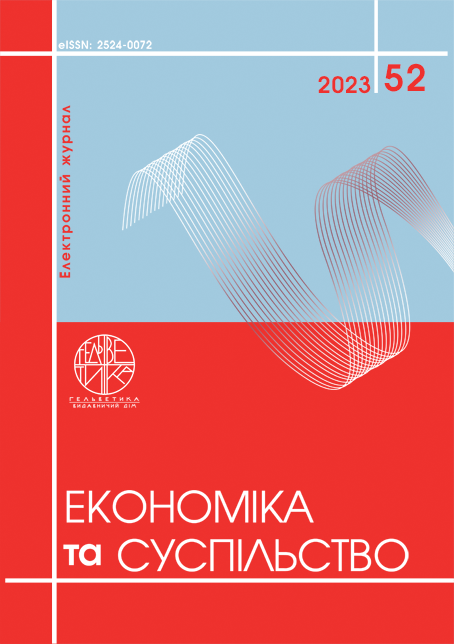THE ROLE OF THE SERVICES SECTOR IN ENSURING THE COMPETITIVENESS OF THE NATIONAL ECONOMY IN THE CONTEXT OF SUSTAINABLE DEVELOPMENT
Abstract
The article is focused on the study of the influence and role of the service sector in ensuring the competitiveness of the national economy in the context of the implementation of the concept of sustainable development. A historical analysis of the development of the concept of "sustainable development" was carried out, its main components were investigated. It was established that the service sector, due to the inclusion of social services (such as education and health care), directly affects the implementation of the social component of the concept of sustainable development and ensuring of social progress. The impact on the economic and environmental components is carried out due to the direct functioning of the service sector and its interaction with other sectors of the economy. The presence of direct and indirect influence of the service sector on ensuring competitiveness was determined. The direct impact is related to the effectiveness and productivity of the activities of the service sector, the indirect impact is caused by the development of other sectors of the country's economy due to the use of services. Taking into account the importance of the service sector in increasing the competitiveness of the national economy, as well as its influence on ensuring sustainable development, a conclusion was made about the essential role of the service sector in the formation of sustainable competitiveness of the country, which corresponds to the main ideas of the concept of sustainable development and guarantees the strong competitive position of the country in the global division of labour. The following promising directions for accelerating the formation of sustainable competitiveness are proposed: encouraging the development and implementation of environmental services; development of sustainable tourism; provision of educational services to raise awareness of the principles of sustainable development; implementation of ethical and responsible business practices; cooperation with other sectors to create sustainable development initiatives; implementation of innovative technologies and practices in the activity of the service sector.
References
Report of the World Commission on Environment and Development “Our Common Future”. URL: https://ambiente.files.wordpress.com/2011/03/brundtland-report-our-common-future.pdf
Allen C., Metternicht G. & Wiedmann T. Prioritising SDG targets: assessing baselines, gaps and interlinkages. Sustainability Science. 2019. № 14. Pp. 421–438. DOI: https://doi.org/10.1007/s11625-018-0596-8
Mensah, J. (2019). Sustainable development: Meaning, history, principles, pillars, and implications for human action: Literature review. Cogent Social Sciences. 2019. № 5 (1). pp. 1–21. DOI: 10.1080/23311886.2019.1653531
Weitz, N., Carlsen, H., Nilsson, M., & Skånberg, K. (2017). Towards systemic and contextual priority setting for implementing the 2030 agenda. Sustainability Science. № 13(2), 531–548. DOI: https://doi.org/10.1007/s11625-017-0470-0
Transforming our world: the 2030 Agenda for Sustainable Development. United Nations. A/RES/70/1. 21 October 2015. URL: https://documents-dds-ny.un.org/doc/UNDOC/GEN/N15/291/89/PDF/N1529189.pdf?OpenElement
Daly, H.E. U.N. conferences on environment and development: retrospect on Stockholm and prospects for Rio. Ecological Economics: the Journal of the International Society for Ecological Economics. 2019. № 5, pp. 9–14. DOI: https://doi.org/10.1016/0921-8009(92)90018-N
Остафійчук Я.В. Місце сфери послуг у сучасній парадигмі сталого розвитку. Інвестиції: практика та досвід. 2012. № 3. С. 30–32.
Pérez, L., Hunt, D.V., Samandari, H., Nuttall, R. & Biniek, K. (2022). Does ESG really matter – and why? McKinsey Quarterly. URL: https://www.mckinsey.com/capabilities/sustainability/our-insights/does-esg-really-matter-and-why
World Development Indicators: Structure of value added. URL: https://wdi.worldbank.org/table/4.2
World Competitiveness Ranking. URL: https://www.imd.org/centers/wcc/world-competitiveness-center/rankings/world-competitiveness-ranking/
World Trade Statistical Review 2022. URL: https://www.wto.org/english/res_e/booksp_e/wtsr_2022_e.pdf
Gill, I. (2021). At your service? Developing economies bet on service industries for growth. URL: https://blogs.worldbank.org/voices/your-service-developing-economies-bet-service-industries-growth
Nayyar, G., Hallward-Driemeier, M. and Davies, E. At Your Service? The Promise of Services-Led Development. Washington, DC: World Bank, 2021. 315 p. DOI: https://doi.org/10.1596/978-1-4648-1671-0
Report of the World Commission on Environment and Development “Our Common Future”. Available at: https://ambiente.files.wordpress.com/2011/03/brundtland-report-our-common-future.pdf
Allen, C., Metternicht, G. & Wiedmann, T. (2019). Prioritising SDG targets: assessing baselines, gaps and interlinkages. Sustainability Science, no. 14, pp. 421–438. DOI: https://doi.org/10.1007/s11625-018-0596-8
Mensah, J. (2019). Sustainable development: Meaning, history, principles, pillars, and implications for human action: Literature review. Cogent Social Sciences, no. 5 (1), pp. 1–21. DOI: https://doi.org/10.1080/23311886.2019.1653531
Weitz, N., Carlsen, H., Nilsson, M., & Skånberg, K. (2017). Towards systemic and contextual priority setting for implementing the 2030 agenda. Sustainability Science, no. 13(2), pp. 531–548. DOI: https://doi.org/10.1007/s11625-017-0470-0
Transforming our world: the 2030 Agenda for Sustainable Development. United Nations. A/RES/70/1. 21 October 2015. Available at: https://documents-dds-ny.un.org/doc/UNDOC/GEN/N15/291/89/PDF/N1529189.pdf?OpenElemenO
Daly, H.E. (1992). U.N. conferences on environment and development: retrospect on Stockholm and prospects for Rio. Ecological Economics: the Journal of the International Society for Ecological Economics, no. 5, pp. 9–14. DOI: https://doi.org/10.1016/0921-8009(92)90018-N
Ostafiichuk, Ya.V. (2012). Mistse sfery posluh u suchasnii paradyhmi staloho rozvytku [The place of the service sector in the modern paradigm of sustainable development]. Investytsii: praktyka ta dosvid, no. 3, pp. 30–32. [in Ukrainian]
Pérez, L., Hunt, D.V., Samandari, H., Nuttall, R. & Biniek, K. (2022). Does ESG really matter – and why? McKinsey Quarterly. Available at: https://www.mckinsey.com/capabilities/sustainability/our-insights/does-esg-really-matter-and-why
World Development Indicators: Structure of value added. Available at: https://wdi.worldbank.org/table/4.2
World Competitiveness Ranking. Available at: https://www.imd.org/centers/wcc/world-competitiveness-center/rankings/world-competitiveness-ranking/
World Trade Statistical Review 2022. Available at: https://www.wto.org/english/res_e/booksp_e/wtsr_2022_e.pdf
Gill, I. (2021). At your service? Developing economies bet on service industries for growth. Available at: https://blogs.worldbank.org/voices/your-service-developing-economies-bet-service-industries-growth
Nayyar, G., Hallward-Driemeier, M. and Davies, E. At Your Service? The Promise of Services-Led Development. Washington, DC: World Bank, 2021. 315 p. DOI: https://doi.org/10.1596/978-1-4648-1671-0

This work is licensed under a Creative Commons Attribution 4.0 International License.


